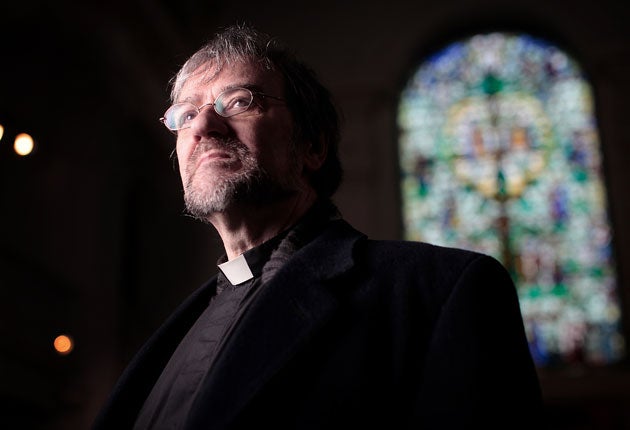Vicar hits out at council's ban on lapdancing clubs
Move will only drive sex workers underground

A vicar who provided inspiration for a hit TV series about a maverick clergyman has attacked a local authority ban on strippers, lap dancers and sex shops in his parish.
Reverend Paul Turp – the inspiration for Father Adam Smallbone in the BBC comedy Rev, played by Tom Hollander – this weekend strongly criticised a London council for attempting to "impose a moral code" on residents and visitors by outlawing lap dancing, sex shops and adult cinemas in the area.
Hackney council voted last week for what it called a "nil" policy, banning any new strip venues from opening and holding out the likelihood that four existing clubs will lose their licences as they come up for renewal. The policy was approved despite more than 66 per cent of people who took part in a public consultation on the plans saying "no" to the ban.
Reverend Turp, of St Leonard's Church in London's Shoreditch, said he was "hugely disappointed" with the decision, adding that it will "push the business underground, resulting in more women working dangerously on the streets" and will add to the people who turn to his church for help.
The clergyman, who provides refuge for 17 homeless people, as well as caring for alcoholics, addicts and prostitutes, said: "The council have created a problem where there wasn't one to begin with. They deliberately disregarded the views of the people."
The local authority's clampdown on strip clubs derives from the 2010 Policing and Crime Act, which gives councils greater authority in the licensing of strip clubs. The policy also removes sex establishments' rights of appeal if licence renewal is refused.
Bill Parry-Davies, a solicitor who is representing two of the existing clubs, said the local authority had abused its powers and plans further legal moves to challenge the ban: "Hackney's policy seems ideologically driven, regardless of its consequences in the real world. It's regressive. People fought to protect women by introducing licensing. The courts will want to look very closely at a policy which seeks to deny a licensee's right of appeal and the courts' jurisdiction in such a manner."
Jennifer Richardson, a stripper at Browns, one of the strip clubs in Shoreditch said working at a licensed club provided a much-needed level of security: "I feel very safe. There is always security around the club." Reacting to the council's decision, the 28-year-old Oxford graduate and one of leaders of the campaign against closures said: "I'm disgusted but not surprised."
Denise Chandler, who has owned and run Browns since 1984, said: "Refusal of licences will criminalise striptease in Shoreditch. Common sense has gone out of the window."
But Hackney councillor Emma Plouviez said that she thought the "nil" policy was the right thing to do: "When we had the application for a new establishment it did provoke more opposition than anything else," she said. "That's where this policy came from: this policy wasn't dreamed up by a bunch of mad, rabid feminists."
But Mr Turp warned that, unless overturned legally, the policy was likely to lead to danger for strip club workers and disruption for members of the public: "A wretched mistake has been made. Hackney 30 years ago was a very dodgy place. I remember the struggle to get these places licensed. Now they are well run and safe."
Join our commenting forum
Join thought-provoking conversations, follow other Independent readers and see their replies
Comments